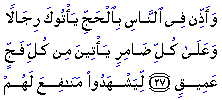Benefits of Hajj, Journey for Forgiveness, Quantity Vs. Quality, Gap Between Scholars and Non-Scholars
Issue 358 » December 23, 2005 - Zul-Qada 21, 1426
General
| Living the Quran |
Al-Hajj
(The Pilgrimage)
Almighty Allah had commanded Abraham to make a general proclamation of Hajj, the first reason given for this commandment is : "That they may come here and witness things that are of benefit to them". That is to say that they may undertake the journey and assemble here and witness with their own eyes that it is intended for their benefit only and its advantages can be noticed only when a man personally experiences it by performing the task himself. It is narrated about Imam Abu Hanifa that until he had not performed the Hajj he was doubtful as to which act of worship was superior among the worships of Islam. But when on performing the Hajj he witnessed the numerous benefits hidden in it, he unhesitatingly declared that Hajj is superior to all. The word "benefits" is in the indefinite, implying all types and numerous forms of benefits. Worldly benefits include trade, business and other commercial benefits. Most notable among these benefits are the purification of the soul, refinement of character, refreshing of one's spirit and the spiritual training that takes place in the most honourable land on this earth. In addition to the points made above, one may note some of the following benefits of Hajj:
Source: |
| Understanding the Prophet's Life |
| Journey for Fogiveness One who intends to perform Hajj should first make Tawbah (repentance to Allah), settle his debts, prepare sufficient provision for his journey and for his family until his return, give back trusts to their rightful owners, and meet his expenses by lawful means. He is recommended to accompany righteous men to help each other in their journey. If there are a group of people going out for Hajj, they should choose one of them to be their leader during their journey so as to set their affairs in order. The pilgrim should stick to the Islamic good manners in all aspects, ask righteous people to make Dua (supplication to Allah) for him, and say the authentic Prophetic supplications that the Prophet, peace and blessings be upon him, is reported to have said on his journey and making Hajj. These Prophetic supplications are dealt with in detail in the books of Fiqh, so one should refer to them for more information in this regard. You should get yourself well-acquainted with the fact that there is no way of drawing to Allah, Most High, except by getting rid of desires, abstaining from pleasures, confining oneself to necessities and devoting oneself exclusively to Allah, Most High, in every moment and rest. Hajj is decreed by Allah to be the ascetic act of the Muslim Ummah. The pilgrim is recommended to free his minds from all businesses except the obedience of Allah, Most High. He should be dressed simply and keeping away from adornment or inclining to things that excite pride and rivalry. Here, we may recall the narration of Jabir, may Allah be pleased with him, that the Prophet, peace and blessings be upon him, said: "Allah, Most High, boasts before the angels about the pilgrims, saying, 'Look at My servants; they came to Me, disheveled and dusty, from every deep ravine. I make you witness that I have forgiven them.'" (Reported by ibn Khayzamah) Source: |
| Unlearn! |
In the attempt to extinguish a burning desire for ‘learning Islam or Deen’, many practicing Muslims, often take extreme approaches to the study of Islam that are devoid of practicality and spirituality. In order to overcome this problem we need to unlearn, before we learn. This section is covering some misconceptions that we need to unlearn before we move on to learning Islam. Quantity versus Quality In Islam, training (Tarbiyyah) and character-development is a life-long process. It’s not about quantity, it’s about quality. The great companions of the Prophet Muhammad, peace be upon him, always made sure to first practice whatever they knew. Abu Darda, may Allah be pleased with him, used to say, “I am not afraid that it will be said to me (on the Day of Judgement): ‘What have you learnt?’ But I am more afraid that it will be said to me: ‘What have you done with what you have learnt?’” How do we plan to use the knowledge that we gain in our lives? Unbridgeable Gap Between Scholar and non-Scholars As Dr. Mattson argues, there is really no difference between a ‘traditional scholar’ and a layperson, because a knowledgeable and pious professional or entrepreneur, in principle, is a scholar as well in a specialized field, since he learns what he needs to know about his profession and applies this knowledge in his everyday life which could be passed on to others who seek it. In our present day and age, we need scholarship that specializes in contemporary disciplines, such as medicine, economics, arts, media, social services, engineering and others, to provide Islamic perspectives and alternatives in these fields. Source: |
